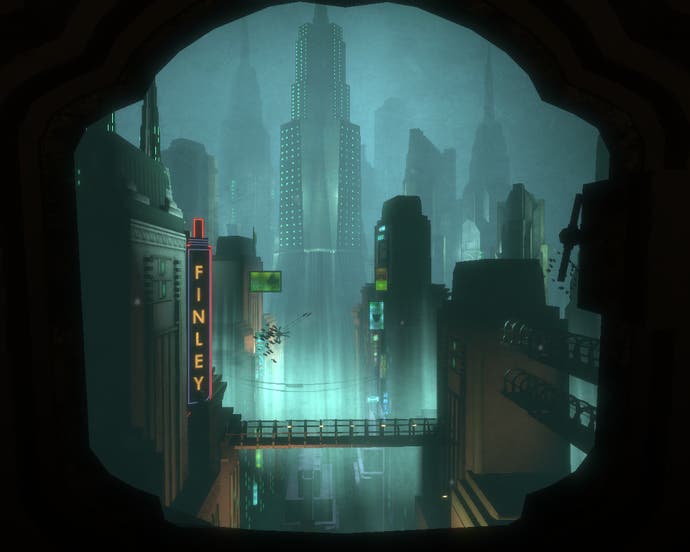Saturday Soapbox: The lost art of keeping a secret
Are big budget games losing their mystery in the face of aggressive marketing?
When was the last time you were surprised by a game? Actually, let's get more specific: when was the last time you were genuinely taken aback by a narrative or mechanical development in a big budget console game?
For me, it was Assassin's Creed 3. If you've played it, you'll know what I'm talking about; if not, I won't spoil it in case you eventually do. Suffice to say for a game so heavily promoted, so frequently detailed and discussed in previews, trailers and promotional clips to suddenly offer something unknown felt like quite the achievement, particularly in this day and age where internet archaeologists regularly unearth hidden treasures before publishers are ready to reveal them. I respected Ubisoft for managing to keep a lid on it, even if that respect evaporated through the remainder of the game.
But I digress. After a while I began to wonder whether the impact of the surprise had something to do with the fact that almost everything else in the game was a known quantity. I knew about the naval battles, about the treasure-seeking missions. I knew about the enormous sandbox environment that connected the two main cities and the hunting asides therein. I knew which historic events formed the backbone of the narrative. I knew not only the protagonist's name, but almost everything about his character. Heck, Ubisoft itself manages to spoil a key plot twist with an entry in the Animus database - admittedly, I didn't notice that until after the fact, but those immersed in the lore will likely have made that discovery a little earlier than planned.
Compare and contrast, if you will, with the approach of Swedish studio Simogo, which felt pressed to explain the lack of information surrounding its forthcoming iOS title Year Walk. In a blog entry posted last month, artist/composer Simon Flesser explained his company's stance.

"We personally feel that a lot of the reporting on games is very spoilerish, and we've had a lot of gaming experiences lessened by that fact," said Flesser. "Of course we realise that we cannot decide whether you decide to watch preview videos or not (and that decision should totally be up to you!), but we believe that the element of surprise and discovery in Year Walk is one of its biggest appeals, and we do not want to take that away from you."
It's an argument I'm wholly sympathetic to - even if, oddly enough, the blog ends up revealing a few tidbits I'd rather not know. Like Flesser, I too "miss the days when we played games without knowing every little detail about them before starting to play". Sure, in the internet age it's often difficult to avoid spoilers, but publishers and developers are often so eager to spill the beans that you can find out things you've actively been trying not to discover.
The drip-feed of character announcements for Batman: Arkham City is one such example, but it's far from the worst. The potentially iconic moment in Star Wars: The Force Unleashed where Starkiller Force-pulls a Star Destroyer into crashing might have carried greater weight had an image of that very scene not featured on most of the promotional materials. (If you want more examples, head over to TV Tropes for a more comprehensive list.)
I've heard friends and colleagues say they're heartily sick of certain games before they've even arrived thanks to the overwhelming volume of marketing that surrounds them. Little wonder, when campaigns can and do begin upwards of 18 months before a game's release. I'd be tempted to dismiss this as a hazard of the profession - we writers have our own roles to play in controlling the flow of information, of course - but for the fact that I've heard others make similar complaints. Even outside the enthusiast bubble, it's increasingly difficult to go into a game completely cold.
I fully understand why publishers do this. Games are expensive, after all, and in the current market where the fate of a studio can rest on the performance of a single title, it's crucial to communicate a game's appeal to the widest possible audience. The best way of doing that, of course, is to show it off, and whether it's in the form of promotional footage or a round of previews and interviews, the result is the same: the reader/viewer is better appraised about the nature and content of the game, which can thus inform a purchasing decision. It's understandable that people want to know what they're letting themselves in for when they're spending north of £40.

Perhaps that's the key difference between marketing big budget games and cinema: people are more willing to take a chance on a film they might not like because the investment is significantly less. Having said that, Hollywood is equally guilty of showing its hand too soon: we've all seen trailers that are little more than three-minute synopses of a film's plot.
And besides, is the glut of information that spews forth at every expired embargo really all that different to getting the new issue of Super Play or Amiga Power and poring over every bit of information about an anticipated title? Sure, we had to rely on static images and words back then, but getting excited about a forthcoming game has always been part of the fun.
Even so, I'd like to think it's possible for publishers to show a little restraint from time to time. In one respect it's arguably easier for the likes of Simogo to keep things quiet: certainly I've felt that all-important sense of discovery more frequently on iOS of late, though when it comes to taking a leap into the unknown, it helps that the price barrier is so easy to clear. But then again, in a market where small developers have to shout to let their games be heard above the noise, such a low-key approach is a definite risk. It's clearly an artistically motivated rather than a commercially driven decision, and if you ask me, that's something to be celebrated.
Can bigger games afford to be so brave? Perhaps it's naïve of me to think so, but I'm convinced that it's possible for marketers to maximise a game's commercial prospects without stymieing its creative potential. Hopefully, lessons can be learned from Ubisoft's misdirection and Simogo's secrecy, and perhaps then big budget console games will be able to amaze us with their content as much as their technical competence.

